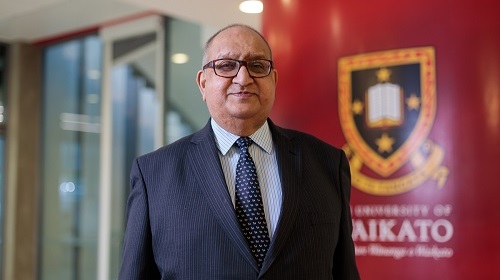Annual Report for The University of Waikato
The Annual Report provides detailed information on the University's financial status and summarises the activities and achievements of the University.

2024 Annual Report
The Annual Report provides detailed information on the University's financial status and summarises the activities and achievements of the University of Waikato.
From the Chancellor

E tēnā koutou katoa
My Chancellor’s report for this year mirrors change and advancement, which are at the centre of the well-known whakataukī ‘Ko te kawa o te ora’: We are not afraid of change because it has led to new beginnings in the past.
Sadness followed the death in August at age 69 of Kīngi Tūheitia Pōtatau Te Wherowhero VII. During his 18-year reign, Kīngi Tūheitia was closely involved in many key University milestones, most recently in the construction and opening of The Pā, including the naming of the wharenui Ko Te Tangata. Kīngi Tūheitia had continued the tradition of the Kīngitanga as a powerful expression of Māori unity,
dedicating his life to the service of others.
University staff, students and alumni joined the thousands who gathered at Tūrangawaewae Marae to pay their respects to his memory. The University pouwhenua, gifted by Kīngi Korokī to mark the University's opening in 1964, was displayed as a symbol of the enduring relationship and support given to the University.
Succeeding him is his daughter, a graduate of the University, Te Arikinui Kuini Ngawai hono i te po Pōtatau Te Wherowhero VIII, which was a special point of reference for the University community, as she had been appointed as her father’s representative and the Kīngitanga appointee on the University Council in the year prior. Upon accepting office as Māori Queen, Te Arikinui has stood down from the University Council and a new representative will be confirmed in due course.
Otherwise, this year the University had much to celebrate as it marked 60 years since its inception, and the calendar was filled with events involving the University and wider community, some of which I had the privilege to attend. Reflecting on the history to date of the University and its founding by the community, for the community, it is clear that as we look to the future, the Waikato story still reflects a combination of vision, perseverance, collaboration and commitment.
Among the events held was a 60th anniversary dinner where the University awarded three outstanding individuals with Distinguished Alumni Awards – professional director, Bella Takiari-Brame, digital technology leader, Stephen Knightly, and law and governance specialist, Rukumoana Schaafhausen. These awards are a vital chance to demonstrate the capacity of the Waikato alumni community in a global sense, and is something of which I share pride.
The anniversary also provided an opportunity to highlight the University’s research reputation through an inaugural TEDx event, an initiative led by the new Deputy Vice-Chancellor Research, Professor Gary Wilson. The event celebrated research achievements, thought leadership and new perspectives on some of the world's most challenging issues – climate change, social injustice, education, sustainability, racial and gender equality, biodiversity loss, and changing demographics.
The event featured speakers from various disciplines within the University community, ranging from emerging researchers to established experts. Staff contributing included Senior Research Fellow Dr Jesse Whitehead on health research; lecturer Dr Amanda Williamson on artificial intelligence potential; environmental scientist Dr Luke Harrington on climate change effects; Professor Jason Mika on reciprocity potential; scientist Dr Marie Magnusson on the potential of seaweed; and Professor Iain White on the interplay between policy funding and research. The videos of each talk are now available on the TEDx platform, enabling a global reach for the University and these staff members.
Other highlights throughout the year included the awarding of Honorary Doctorate degrees to four community leaders who have shown a significant contribution to the University and its region and New Zealand as a whole. The recipients were civil engineer, entrepreneur and philanthropist, Sir Paul Adams; educator and political leader Hon Te Ururoa Flavell; health advocate and leader, Lady Tureiti Moxon;
and distinguished soldier, diplomat and former Governor-General, Sir Jerry Mateparae.
A significant loss to the University community was the passing of its kaumātua, Takiri mai te Ata Turner. Koro Taki, as he was affectionately known, had served the University in this role since 2015 and was a constant and visible presence at all key University events, notably graduation ceremonies. There will be thousands of students, staff and alumni who will have enjoyed Taki’s presence at these events and his
unique ability to blend formality with inimitable humour and aroha. The University was pleased to acknowledge his immense contribution with a posthumous award of a University of Waikato Medal to his whānau.
During the year the University was also pleased to provide a University of Waikato Medal to its Tauranga campus kaumātua, Matua Tamati Tata, to acknowledge the special relationship Matua Tamati has with the campus and its students and staff, and the contribution he makes to the
University on a daily basis.
I wish to end by paying tribute to my fellow members of the University Council who provide governance leadership for the University with a diverse and complementary range of skill sets and experience. The University continues to enjoy a collaborative relationship with the Waikato Students’ Union and this year has been no different with the student representative on Council being George Liu.
Nga mihi atu, tena koutou katoa.
Rt Hon Sir Anand Satyanand GNZM QSO
Chancellor
Vice-Chancellor's Overview
E ngā mātāwaka o te motu, e rau rangatira mā, tēnā koutou katoa.
Rarau mai ki Te Whare Wānanga o Waikato, ki te ahurewa o tūmanako, o wawata, o moemoeā.
Pike mai, kake mai, whakatau mai ā te ngākau ki a koutou katoa.
 This year saw the end of the University’s 2022-2024 Strategy, which was primarily focused on recovering from the financial impacts of the Covid-19 pandemic. This period has seen a lot of hard work from our staff to stabilise our operations and implement a range of initiatives to strengthen student recruitment and retention and close the gap on our projected financial deficit.
This year saw the end of the University’s 2022-2024 Strategy, which was primarily focused on recovering from the financial impacts of the Covid-19 pandemic. This period has seen a lot of hard work from our staff to stabilise our operations and implement a range of initiatives to strengthen student recruitment and retention and close the gap on our projected financial deficit.
Our 2024 result shows these strategies have paid off with strong domestic EFTS and our international EFTS clearly returning to pre-pandemic levels. We have also made significant financial progress, shifting the University from a projected financial deficit of $6m at the start of 2024 to a Group surplus of $8.4m ($4.4m Parent).
This recovery journey has not been easy, and I acknowledge the work of all of our staff and the support of the University leadership and Council in achieving these milestones. This year’s result positions the University for the implementation of a new University Strategy over the coming five years. A further highlight of the year has been the celebration of the University’s 60th anniversary, with a range of engagements with different stakeholders over the course of the year. These events have shown the extent of support the University has in the wider community, the pride from within the University surrounding its history, and the positive trajectory it is on as we embark on the next chapter.
Activation and development of our campuses has continued as we look for new ways to cement ourselves as a destination for students and the wider community. Among these initiatives I note particularly the opening of HIKO Hub, a co-working precinct for external tenants, both providing a source of revenue for the University and opportunity for business and industry to integrate with the University community and its expertise.
The Pā received a highly commended award at the prestigious World Architecture Forum and is seeing growing demand for student and staff activities, external conferences and private events. In Tauranga, the University opened a new recreation and social space for students and signed a lease with the Tauranga City Council to establish a state-of-the-art marine research and education facility at Sulphur Point.
The University formalised the establishment of a standalone Division of Health in recognition of its expanding health programme offerings, under the leadership of Pro Vice-Chancellor Professor Jo Lane. The Division continued with the development of new graduate entry programmes in midwifery and pharmacy in 2024, and appointed Professor Rhiannon Braund to lead the new school of Pharmacy and Biomedical Sciences. The University has also continued to progress the proposal for a new medical school, signing an MOU with the Ministry of Health and Health New Zealand to progress the Cost Benefit Analysis and Detailed Business Case.
During the year the University also welcomed new members to its executive team. Professor Gary Wilson joined as Deputy Vice-Chancellor Research in February, and Professor Jennifer Milam joined as Deputy Vice-Chancellor Academic in November. Both bring extensive leadership experience and expertise in their fields and are ambitious in their plans for the University to develop further as a comprehensive and globally recognised institution with strong teaching, learning and research foundations.
Research successes for the year included strong external research income and the second highest number of Marsden Fund grants the University has ever seen. Staff teaching achievements included Dr Kim Hébert-Losier who received a 2024 Te Whatu Kairangi – Aotearoa Tertiary Educator Award.
University recruitment and engagement efforts have been bolstered this year with the launch of a new public facing website, providing a much-needed improvement to the search quality and user journey to navigate all that the University has to offer. The completion of the new website was the end of a two-year project to overhaul and simplify our website information for prospective students and their families, stakeholders and the community, and involved many staff from across the University.
The University was pleased to formalise a new strategic partnership with the University of Newcastle in Australia, creating additional opportunities for collaboration in research, teaching and professional services, building from its existing long-standing relationship.
Over the course of the year the University has engaged with staff, leadership and Government representatives regarding the establishment of the advisory groups established for the university sector and the science sector. The University has made submissions at all available phases of these two groups and will continue to engage constructively in the consultation and feedback processes.
In 2024, the University celebrated a climb of a further 15 places in the QS World University Rankings, to 235. This was a significant achievement that placed Waikato in the top three universities in New Zealand. We retained the number one position in New Zealand for research, based on the citations per faculty member metric of QS. The University also achieved commendable results in the QS Sustainability Ranking and the Times Higher Education Impact Ranking relative to the growing number of institutions participating in these rankings.
Reflecting on the year, it has been one of celebration, progress and positivity at the prospect of what our next chapter holds. Once again, I acknowledge the role that all University staff, the leadership team and the University Council have played in what has been a highly successful and momentous year.
Professor Neil Quigley
Vice-Chancellor
2024 at a glance
- Ministry-funded equivalent full time students (EFTs):
- 2,230 (up 4.2%) Māori students
- 781 (up 4.5%) Pacific students
- 8,692 (up 2.6%) domestic students
- 2,710 Ministry-funded EFTs generated by international students:
- 1,807 onshore international students
- 903 offshore international students
- QS World University Ranking 235 (up 15 places)
- 5,394 Work-Integrated Learning experiences taken, up 52% on 2023
- 4,225 Qualifications completed, up 14% on 2023
- 39% Proportion of Professors identify as female, 14% increase since 2019
- 15.4% Earnings before interest, taxation, depreciation and amortisation as a proportion of revenue, up from 11% in 2023
Latest Annual Report
Past Annual Reports
-
2023 Annual Report (4.1 MB)
-
2022 Annual Report (8.3 MB)
-
2021 Annual Report (5.2 MB)
-
2020 Annual Report (1.9 MB)
-
2019 Annual Report (3.9 MB)
-
2018 Annual Report (5 MB)
-
2017 Annual Report (3.9 MB)
-
2016 Annual Report (3.5 MB)
-
2015 Annual Report (4 MB)
-
2014 Annual Report (6.7 MB)
-
2013 Annual Report (6 MB)
-
2012 Annual Report (4.6 MB)
-
2011 Annual Report (2.3 MB)
-
2010 Annual Report (1.3 MB)
-
2009 Annual Report (1 MB)
-
2008 Annual Report (604 KB)
-
2007 Annual Report (876 KB)
-
2006 Annual Report (1 MB)
-
2005 Annual Report (1.5 MB)
-
2004 Annual Report (1.5 MB)
-
2003 Annual Report (1.3 MB)